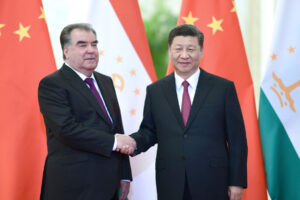Taipei and Washington are discussing a tax agreement, which they hope to conclude in the next few months, in a move that would benefit TSMC and other Taiwan companies running operations in the US, a senior Taiwanese official said on Monday.
Economic Affairs Minister Wang Meihua, speaking ahead of an event in Seattle, told reporters that after recent discussions “hopefully in the near few months, we can have the conclusion about the ADTA [Avoidance of Double Taxation Agreement] issue.”
Wang said it was “very important” to avoid double taxation as investment by both sides grows. She highlighted the problem by referring to giant chip maker Taiwan Semiconductor Manufacturing Company (TSMC) and its US investments.
“TSMC and [its] supply chain, if they are investing in the US, may face the double taxation issue,” Wang said, ahead of an event organised by US think tank National Bureau of Asian Research in Seattle.
Wang is in Seattle for the two-day Apec energy ministers’ meeting, which begins on Wednesday.
Taiwanese politicians and private enterprises have been pushing for an agreement for decades, but there is now stronger support from the US Congress because of rising US-China rivalry and Washington’s plan to strengthen its semiconductor industry.
US direct investment in Taiwan topped US$16 billion in 2021, while Taiwanese investment in the other direction reached US$17 billion, according to Washington-based NGO the Global Taiwan Institute, making the island the United States’ 10th largest trading partner.
In contrast to US arrangements with all its other top trading partners, Washington has no formal tax treaty with Taiwan that can deal with the double taxation issue. There has also been no official White House announcement that talks are taking place.
Like most countries, the US does not recognise Taiwan – regarded by Beijing as part of its territory – as an independent state and has no diplomatic ties with Taipei.
Taiwanese President Tsai Ing-wen told a visiting delegation of conservative US Republican lawmakers in July that an agreement would encourage bilateral investment and trade cooperation.
Her remarks followed the introduction in May by a group of US senators of the Taiwan Tax Agreement Act of 2023, a bill authorising a tax agreement with Taipei.
According to the senators, “an eventual treaty would help boost investment between the United States and Taiwan by cutting out double taxation”.
The Global Taiwan Institute, which is dedicated to enhancing the relationship between the island and the US, said in July that the absence of an agreement “creates an unequal playing field and reduces the bottom line for Taiwanese companies relative to their market competitors”.
According to analysis from the institute, Taiwanese companies have a tax burden two to three times heavier when remitting dividends, interests or royalties from the US compared to their Chinese, Australian or South Korean counterparts.
On Monday, Wang said the tax agreement talks were on her wish list of moves to enhance economic and trade ties with Washington, along with the next phase of the 21st Century Trade Initiative, a framework for discussions launched last year.
Taipei and Washington signed their first agreement under the initiative on June 1, which covered streamlining customs procedures, combating corruption and helping small businesses navigate regulatory procedures in both markets.
Wang said the market access issue, which was absent in the first agreement talks, would be addressed “when the time is right”.
She also responded to TSMC’s latest setback to establishing its plant in Arizona, where a trade union is demanding that lawmakers deny visas to Taiwanese workers the company wants to bring in, to speed up construction.
“TSMC is trying their best to communicate to the local society,” Wang said. “If necessary, our governments will help TSMC to have more communication with either the central government or the local government.”
Source : SCMP
















